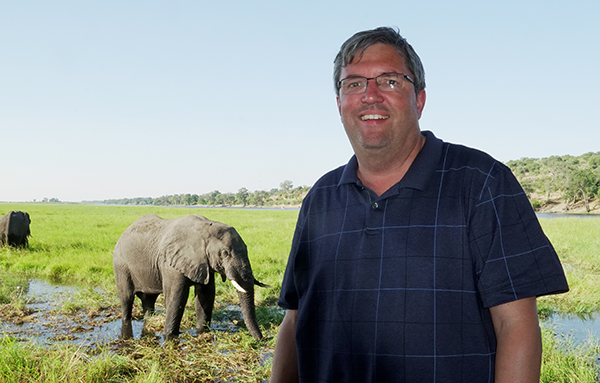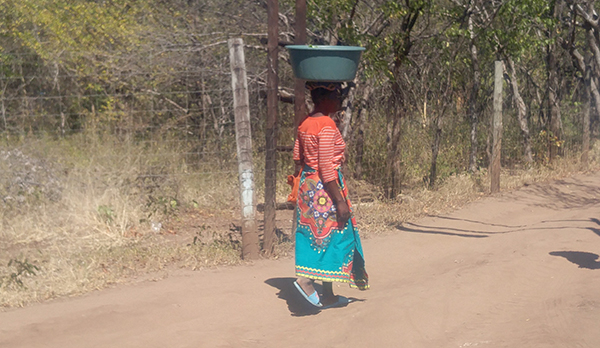News
WSOB Professor Brings Africa Experience to the Classroom
07/09/19
 Dr. Robert Culp saw firsthand just how adaptable companies must be to thrive.
Dr. Robert Culp saw firsthand just how adaptable companies must be to thrive.
Culp, an associate professor of economics at Dalton State’s Wright School of Business, visited South Africa and several surrounding countries to learn more about the application of economic principles in this region. He toured businesses and experienced the culture. He’ll use what he learned in the classroom to expose students to a broader, more global business education.
“What works elsewhere in the world may not work in Africa so the solutions have to be tailored to fit the unique challenges and culture of Africa,” Culp said. “The saying in Africa is ‘Africa solutions for Africa problems.’ When doing business overseas it is important to adjust your company’s way of doing business to fit the local customs, culture, and available resources. In Africa this is particularly true. The culture is very different from country to country, the availability of reliable suppliers, and transportation challenges make doing business there very different from other parts of the world.”
One company he studied described how in other countries they would build one large chicken producing and processing facility. Workers in these countries commute from surrounding areas. However, in Botswana because of a lack of reliable transportation and logistical issues, workers cannot commute long distances to a centralized facility. Supplies needed to run the industry cannot be reliably transported. Instead of one large facility, smaller plants are in place so they can be located close to feed suppliers to avoid transportation issues, Culp said.
“It’s important to realize that to be a successful business owner you have to be flexible,” he said. “You have to think broader about the world. Things that work well here don’t work always well in other countries and other cultures.”
Culp has had a growing interest in economics in African countries. He has served as an external reviewer for South Africa’s National Research Foundation and has performed numerous reviews on African research. The trip allowed him to take what he’s learned on paper and experience it in person.
The trip was funded through a grant from the Centers for International Business Education and Research, which promotes faculty development through traveling abroad. The faculty development program combines business, academic, and governmental visits, as well as cultural experiences so participants can gain a firsthand knowledge of how businesses operate in other regions of the world.
“Faculty study abroad has a synergy like no other experience,” said Dr. Marilyn Helms, dean of the Wright School of Business. “Because our faculty reach almost 800 business students, their experiences abroad are linked immediately to the classroom. Their experiences serve to internationalize our students who may lack the resources or time to participate in a study abroad program. A goal of the WSOB is to expose our students to international businesses and travel experiences like the one Dr. Culp participated in. Doing so leads to new ideas, new lectures, presentations for the area business community, and improved faculty research.
“This experience has a multiplier effect,” she said. “Dr. Culp’s rich examples and experiences will help students understand key economic terms and learn about issues and economic challenges in Africa. With growing global trade, logistics, and distribution, our world is becoming more international and smaller at the same time. These examples and experience enrich our students and motivate them to learn more about other countries and cultures and understand how business practices must be adapted to accommodate the unique needs of different markets.”
 While abroad, Culp visited many types of businesses including a port, a wellness company, a nature conservatory, and the South African equivalent to a chamber of commerce. Technology companies are beginning to thrive, and in many instances improving the livelihood of citizens.
While abroad, Culp visited many types of businesses including a port, a wellness company, a nature conservatory, and the South African equivalent to a chamber of commerce. Technology companies are beginning to thrive, and in many instances improving the livelihood of citizens.
Cell phones are widely used and available throughout Africa, yet healthcare is not readily available particularly in remote villages. One company developed an app and a device facilitates proper prenatal care by analyzing the health and position of the baby in utero.
With limited transportation and access to medical care, the app has helped many. To be effective people had to be comfortable using the device. So the company made it similar in appearance to a Pinard horn, which has been used by midwives in Africa for more than a century, Culp said.
“By taking advantage of the wide-spread availability of cell phones and by being mindful of potential cultural issues, the company has greatly improved prenatal care in Africa,” he said.
Technological advancement has allowed farmers greater protection thanks to an insurance app. In many African countries, farming is done by families instead of large companies, Culp said. This leaves them more vulnerable to excessive rains or droughts. Crop insurance is purchased through an app and connected to satellite weather data. If there’s a weather extreme, the farmer is automatically paid without having to make a claim.
“By reducing the uncertainty associated with farming, we can expect more people to farm and food production in Africa to increase,” Culp said.
The disparity between wealthy people and impoverished people in South Africa is, he said. There are places and areas that feel very Western, such as large shopping malls in Johannesburg. Then there are shanty towns with shacks for homes. Race relations also negatively impacts people’s chance to make a better living, and education for the country’s majority black population is not showing significant signs of improvement, he said.
“There has been a lot of political change, and the questions everyone is asking are, ‘Are these political changes a threat to their economy? Will South Africa’s leadership take these political changes too far and lead to the same economic collapses seen in other African countries like Zimbabwe?’” Culp said. “There is no way to know what political change is too much for the economy to handle. There is no way to know with certainty if an economy is on the edge of collapse. But it’s important to study those contributing factors.”
